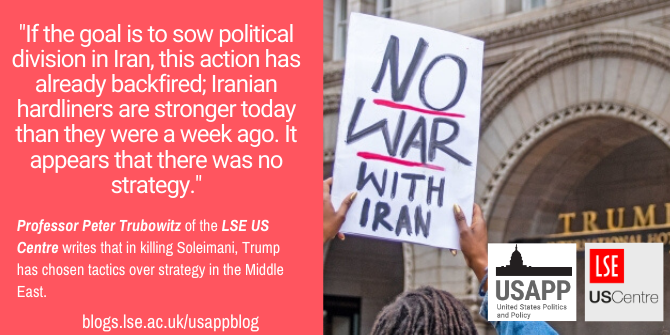 On January 2nd 2020, Iranian General Qasem Soleimani was killed in a US drone strike against his convoy at Baghdad Airport. LSE US Centre Director Professor Peter Trubowitz comments that it appears that there was little or no strategy behind Trump’s decision on the attack: it has not sown political divisions in Iran, and there is little appetite in Washington DC for further escalation.
On January 2nd 2020, Iranian General Qasem Soleimani was killed in a US drone strike against his convoy at Baghdad Airport. LSE US Centre Director Professor Peter Trubowitz comments that it appears that there was little or no strategy behind Trump’s decision on the attack: it has not sown political divisions in Iran, and there is little appetite in Washington DC for further escalation.
Was killing Soleimani a huge miscalculation for the Trump administration?
It is too early to say. We need to wait to see how Iran and others in the region respond to the killing of Soleimani. There are plenty of reasons to worry though. For one thing, the Iranian regime is unlikely to take this lying down, especially given the outpouring of public grief in Iran’s streets. Meanwhile, Trump’s action has left his administration even more isolated domestically than it was before. There is little bipartisan appetite on Capitol Hill for escalating tensions with Iran. Maybe it will materialize but given the fact that Trump did not bother to consult Congress before taking this action, I wouldn’t hold my breath. Meanwhile, the failure to consult any of America’s allies only reinforces the widely held view that Trump really doesn’t care what most of them think.

“04bIMG_8699” by Becker1999 is licensed under CC BY 2.0
Where does this leave Trump’s Middle East strategy?
To the extent that Trump has a strategy in the region, it is hard to see how killing Soleimani strengthened it. Trump often says he wants to get the US out of the Middle East. But he’s just made it harder domestically to do so. Tehran will certainly respond to the assassination, which is likely to result in escalation. If Trump’s goal is to get Iran to make concessions over its nuclear program, Tehran’s first response to the assassination is not encouraging: it has announced that it will no longer be bound by the 2015 nuclear deal. If the goal is to sow political division in Iran, this action has already backfired; Iranian hardliners are stronger today than they were a week ago. It appears that there was no strategy.
Do you think Trump took this action to divert attention from impeachment?
Possibly, but I suspect pressure to respond decisively to the attack on the US embassy in Iraq last week weighed more heavily on Trump. News reports suggest that he was very concerned that his critics would draw comparisons to what happened in Benghazi in 2012 — that Trump feared appearing weak and indecisive. What really needs to be explained is why US policy makers and military commanders put such an extreme option before Trump given his temperament and impulsiveness. It is worth recalling that both George W. Bush and Barack Obama ruled out killing Soleimani because they saw little strategic advantage in doing so and feared that it would significantly raise the risk of war. What was different this time?
- This article is based on interview comments Professor Trubowitz gave to Bloomberg on 7 January 2020. Watch it here.
Please read our comments policy before commenting
Note: This article gives the views of the author, and not the position of USAPP– American Politics and Policy, nor of the London School of Economics.
Shortened URL for this post: http://bit.ly/39LG7Wx
About the author
 Peter Trubowitz – LSE US Centre
Peter Trubowitz – LSE US Centre
Peter Trubowitz is Professor of International Relations, and Director of the LSE’s US Centre. His main research interests are in the fields of international security and comparative foreign policy, with special focus on American grand strategy and foreign policy. He also writes and comments frequently on US party politics and elections and how they shape and are shaped by America’s changing place in the world.






